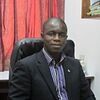
Philip Antwi-Agyei
- Course: PhD in Earth and Environment
- PhD title: Quantitative and qualitative methods to explore the vulnerability and adaptation of Ghana's food systems and rural livelihoods to climate change
- Year of graduation: 2013
- Nationality: Ghanaian
- Job title: Senior Lecturer
- Company: Kwame Nkrumah University of Science and Technology, Ghana
I joined the School of Earth and Environment (SEE) in October 2009. I chose SEE because of the unique opportunity it offers for research. My PhD research used a mix of quantitative and qualitative methods to explore the vulnerability and adaptation of Ghana's food systems and rural livelihoods to climate change and variability.
This research provided a nuanced understanding of the extent of food systems vulnerability to climate change by adopting a multi-scale approach. I was ably supervised by Professor Andrew Dougill, Professor Lindsay Stringer and Professor Evan Fraser (based at the University of Guelph, Canada).
SEE provided the opportunity to develop my research skills in an interdisciplinary setting. I would definitely recommend SEE to any potential PhD student because of its excellent research facilities and a fantastic learning environment. Both the research staff and administrative support staff are always willing to go the extra mile in helping students.
One of the key highlights of my PhD study was when the School awarded me one of the best five PhD student publications prize awards in 2012 for my paper entitled "Mapping the vulnerability of crop production to drought in Ghana using rainfall, yield and socioeconomic data".
For international students, Leeds is also a lovely place to be. It is a modern multi-cultural city with lots of minority groups so you can always find your "local" dishes on the open market. The university campus is also easily accessible by bus and not too far from the Leeds city centre.
After completing my PhD, I worked briefly as a Part-Time Postdoctoral Research Assistant at the Sustainability Research Institute, SEE. During this time, I explored the key barriers to climate change adaptation in sub-Saharan Africa. Following my graduation in July 2013, I returned to my post as a Lecturer at the Kwame Nkrumah University of Science and Technology, Kumasi, Ghana (http://tab.knust.edu.gh/directory/academic/p-antwi-agyei).
My research involves developing innovative multi-scale approaches for assessing vulnerability to climate change (especially in the form of drought sensitivity) for dryland African farming systems. My work uses spatial databases and field-based participatory studies within the broader understanding of how drought affects food production and rural livelihoods with a developing country perspective. Another strand of my research explores how farming households and communities in "vulnerability hotspots" in dryland farming systems are adapting to climate change and variability.
Currently, I am also collaborating with the Centre for Climate Change Economics and Policy on mainstreaming climate compatible development into Ghana's climate change policy. I have a wonderful working relationship with SEE and regularly go to Leeds as a Visiting Researcher.

